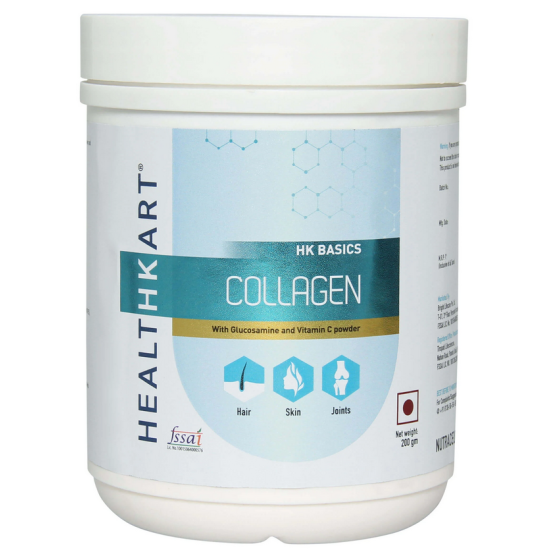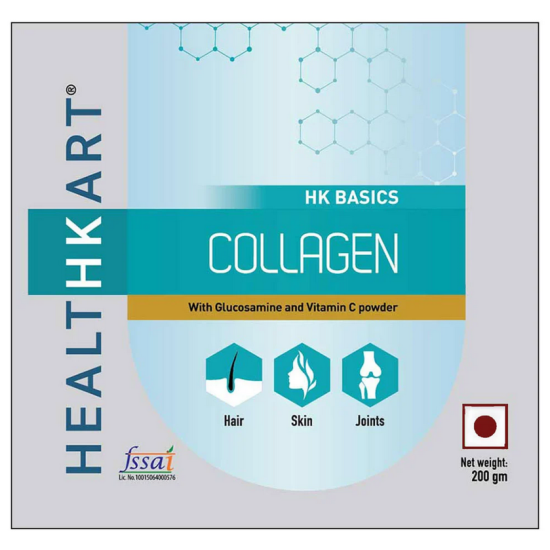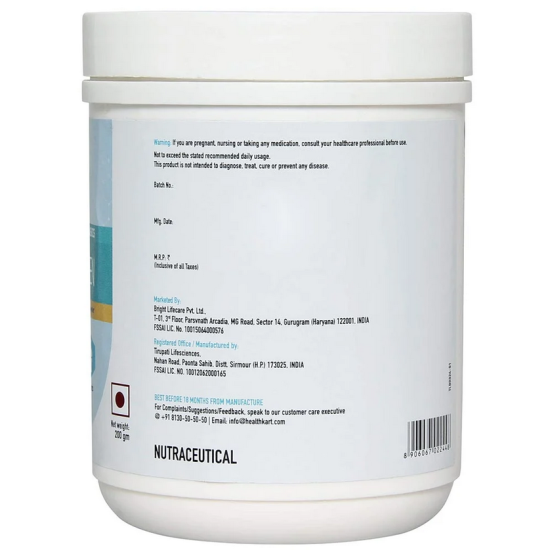


Free Shipping
New



HealthKart Collagen with Glucosamine & Vitamin C, 0.2 kg, Unflavoured
₱1,021
- Stock: 100
- Model: HealthKart
- Healthkart collagen has the goodness of Collagen, Glucosamine & Vitamin C
- Contains Type 1 & 3 collagen
- Collagen and Glucosamine helps in reducing joint pain & has positive effect on knee joint comfort
- Collagen may help in keeping your hair and nails healthy
- Vitamin C improves skin strength & elasticity and reduces signs of ageing
Product Info
General Traits Family Nutrition | ||||
| Quantity | 0.2 kg | |||
| Price per Unit | 4995.0 | |||
| Vegetarian/Non-Vegetarian | Non-Vegetarian | |||
| Form | Powder | |||
| Packaging | Jar | |||
| Country of Origin | India | |||
| Brand Origin | Indian | |||
| Product Code/UPC | 8906067022448 | |||
Special Traits Family Nutrition | ||||
| Concern | Bone/Joint Support,Hair Care,Skin | |||
| Gender | Women,Women | |||
| Lifestage | Adult | |||
Directions | ||||
| Serving Per Pack | 17 | |||
| Serving Size | 12 gram | |||
Flavour Type | ||||
| Flavour | Unflavoured | |||
Supplement Info

Details
Collagen is the most abundant protein in the human body and is the
substance that holds the whole body together. It is found in the bones,
muscles, skin and tendons, where it forms a scaffold to provide strength
and structure.
Collagen for Skin
Hydrolysed Collagen is the best type of collagen for use in a skin
supplement. It is well established that collagen is responsible for skin
strength and elasticity, and its degradation leads to wrinkles that
accompany aging.
As we get older, our body's collagen production reduces which can
result in an increase of wrinkles and fine lines, and decreasing
smoothness and suppleness of the skin. These signs of aging can be
slowed down if your total body collagen levels can be increased. Since
collagen cannot be absorbed through the skin people have turned to
supplementation.
Collagen for Hair
Collagen greatly helps in hair growth and hair regeneration.
It possesses anti-oxidant properties and fights the production of free
radicals in the body. Naturally produced in the body free radicals are a
result of the body’s different metabolic processes and they are
responsible for damaging the hair follicles, leading to hair loss. But
having a sufficient amount of collagen in the hair shaft, strengthens
the hair follicles and improves hair growth. Eating collagen for hair
growth can also improve the overall volume of your hair by increasing
the diameter of each individual hair, thereby giving your flow a fuller
appearance.
Collagen for Joints
Collagen may be beneficial to bones and joints in the same way it
benefits the skin. By helping the body’s natural production of collagen
and providing a bioavailable source of these amino acids, collagen may
improve bone and joint health over time. In fact, a double-blind,
placebo study showed significant improvement in joint pain.
Role of Glucosamine
Glucosamine is a natural compound found in healthy cartilage,
particularly in the fluid around the joints. It can come in several
chemical forms, but the one most used in arthritis is glucosamine
sulfate. It has anti-inflammatory properties and even helps in cartilage
regeneration.
Glucosamine may provide modest pain relief for some patients with
osteoarthritis of the knee, hip and spine. Natural Medicines
Comprehensive Database classified glucosamine as “likely effective” for
osteoarthritis, thus rating it higher than chondroitin. Most of the
studies included in the recommendation were done in patients with
osteoarthritis of the knee.
Role of Vitamin C
Vitamin C is a normal skin constituent that is found at high levels in
both the dermis and epidermis. The vitamin C content of the epidermis is
higher than the dermis, although the vitamin C concentrations in both
layers are approximately equal to that of other water-soluble
antioxidants, including uric acid and glutathione . Aging, however,
causes a decline in vitamin C content in both the epidermis and dermis .
Excessive exposures to UV light or pollutants (e.g., cigarette smoke
and ozone) may also lower vitamin C content, primarily in the epidermis.
The antioxidant properties of vitamin C (ascorbic acid) and its role in
collagen synthesis make vitamin C a vital molecule for skin health.
Dietary ascorbic acid have beneficial effects on skin cells, and some
studies have shown that vitamin C may help prevent and treat ultraviolet
(UV)-induced photo-damage. Higher intakes of dietary vitamin C have
been correlated with a decreased risk of dry skin , suggesting that
ascorbic acid may have effects on trans-epidermal water loss (TEWL).

